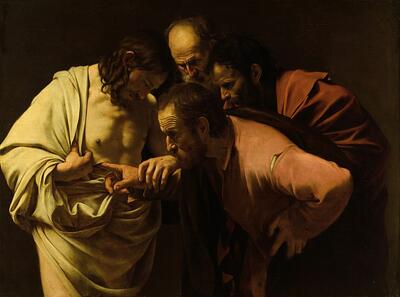The Gift of Thomas' Doubt
I’m a doubting Thomas
I can’t keep my promises
Cause I don’t know what’s safe
Oh me of little faith...
The acclaimed musician and songwriter Chris Thile penned this lyric many years ago in a song unsurprisingly titled “Doubting Thomas.” The song calls to mind the scriptural account we most associate with the Apostle St. Thomas, whose feast we celebrate on July 3). Over the course of the song, the singer is transformed; he seems to still harbor some doubt about his concerns (which are unrevealed in the song), but he trusts someone to keep him safe.
St. Thomas’ own doubt and his transformation is much clearer and more familiar to us. Hearing the account of the risen Lord from the other disciples, Thomas famously told the others who had encountered Jesus, "Unless I see the mark of the nails in his hands and put my finger into the nailmarks and put my hand into his side, I will not believe" (John 20:25).
Many cultural, literary, ecclesial, and musical references since (including Thile’s song) focus on that doubt instead of the faith that Thomas later professes, seeming to forget or not realize the rest of the story. After Jesus reappears and invites Thomas to touch his resurrected body. Thomas openly declares Jesus to be “[his] Lord and God!” So Thomas was not only “Doubting Thomas;” he became a believing, convicted Thomas- who worshiped God and proclaimed the resurrection of Jesus his Lord to the ends of the earth. (In fact, some Christians in India today still call themselves “St. Thomas Christians” tracing their heritage of faith because of the tradition that St. Thomas the Apostle traveled all the way to modern- day India to proclaim the Good News).
Adding to this, Pope St. Gregory the Great (540- 604) helps put Thomas’ doubt into a much different light than many of our own familiar cultural references. He explains that the transformation of Thomas’ doubt to faith serves an important purpose in salvation history. In God’s providence, Christians in the centuries since have read and heard of Thomas’ change of heart and declaration of faith in Jesus. St. Thomas’ doubt has been turned by God into a purposeful gift of witness for us:
Dearly beloved, what do you see in these events? Do you really believe that it was by chance that this chosen disciple was absent, then came and heard, heard and doubted, doubted and touched, touched and believed? It was not by chance, but in God’s providence. In a marvellous way God’s mercy arranged that the disbelieving disciple, in touching the wounds of his master’s body, should heal our wounds of disbelief. The disbelief of Thomas has done more for our faith than the faith of the other disciples. As he touches Christ and is won over to belief, every doubt is cast aside and our faith is strengthened. So the disciple who doubted, then felt Christ’s wounds, becomes a witness to the reality of the resurrection.
Instead of disparaging Thomas for his lack of faith, or even encouraging his readers/hearers to believe in God’s promises or the Resurrection without demanding signs, St. Gregory exhorts us to realize the gift that this account offers us. “The disbelief of Thomas has done more for us than the belief of other disciples.”
This providential look at Thomas’ transformation is even more significant when we consider that it is situated nearly at the end of the Gospel of John. In fact, the two verses immediately after the passage read, “Now Jesus did many other signs in the presence of [his] disciples that are not written in this book. But these are written that you may [come to] believe that Jesus is the Messiah, the Son of God, and that through this belief you may have life in his name.”
While we may wonder what other kinds of things and signs Jesus did, or what else he preached and taught, we can be assured by its presence here that this account of St. Thomas’ faith is meant to strengthen our own faith. And St. Thomas, united with all love in the light of eternity, now sees the full beatific vision and is embraced by Jesus.
In God’s providence, faith the size of mustard seed, or even incredulous doubt transformed into faith can be used by God as a catalyst for grace and the joy of the Gospel to be proclaimed to the whole world.
St. Thomas the Apostle, pray for us!
Hope Zelmer
Hope Zelmer is a writer and a former theology teacher and campus minister at Fenwick High School, a Dominican Catholic preparatory school in Oak Park, Illinois. Hope has written for publications such as FaithND, Church Life Journal, and FemCatholic. She holds a BA and MA in Theology from the University of Notre Dame.


